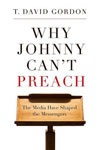Skill Builders
Article
Does Being Tech-Savvy Cripple Preachers?

Why Johnny Can't Preach: The Media Have Shaped the Messengers
by T. David Gordon
P&R Publishing, 2009

The 19th century literary wit Samuel Johnson noted that the thought of impending death tends to focus one's attention. "Depend upon it, sir," Johnson declared, "when a man knows he is to be hanged in a fortnight, it concentrates his mind wonderfully." Author T. David Gordon cites Johnson's observation to explain the prophetic tone of this book. Written during an 11-month period in which the author was undergoing treatment for stage 3 colorectal cancer, Why Johnny Can't Preach reflects the urgency of someone who has an important warning to give and little time to waste. "Perhaps I should have stated the matter less directly (or titled the book less impishly)," Gordon admits, "but cancer only concentrated my mind; it did not necessarily lighten my attitude."
The problem of the church today, as Gordon defines it, is not the absence of great preaching but a dearth of competent preaching. "What I care about is the average Christian family in the average pew in the average church on the average Sunday" Gordon explains. "And the problem there is not that we don't have 'great' preachers; in many circumstances we don't even have mediocre preachers." The reason can be found in the book's subtitle, which is framed as an accusation as much as an explanation. Johnny can't preach because the media have shaped the messengers.
This allusion to the dictum coined by Marshall McLuhan links changes in the pulpit to changes in the culture. In particular, Gordon blames the decline of preaching on the shift from a language-oriented culture to one that is dominated by images. Johnny can't preach, Gordon explains, because Johnny can't read. Reading is on the decline today, and when people do read, they read either for information or content. They are interested in information but have little regard for language.
This disregard for the read word sets the stage for the other fundamental incapacity that has crippled the modern pulpit. Johnny can't preach because Johnny can't write. The viral expansion of communication technology (a description that may be as much an oxymoron as it is a label) has exponentially increased the speed with which we can connect to others, even as it has crippled our ability to use language.
In his book Technopoly, Neil Postman warned that technology is both a burden and a blessing. New technologies offer new opportunities, but they also change "deeply embedded habits of thought." This makes the evangelical church especially vulnerable, because it tends to equate the use of technology with relevance. In the past 25 years evangelicals have learned to be early adopters of new technological forms while remaining largely uncritical of those technologies they employ. We treat technology as if it were merely a tool—something that can be used to share the gospel, build up the church, or stay in touch with the culture. But there is a hidden cost. Postman uncovers the hidden edge to technology when he warns that "embedded in every tool is an ideological bias, a predisposition to construct the world as one thing over another, to amplify one sense or skill or attitude more loudly than another."
Gordon has taken Postman's warning to heart and urges his readers to pay attention to the context of the sermon as well as its content, to method as well as to meaning. He calls for renewed attention to the language and theology of the message. He appeals for the strengthening and maintaining of our abilities to interpret not only the biblical text but any text. And he urges us to keep writing (presumably in lengths greater than 140 characters), for writing develops our ability to think and communicate clearly.
Why Johnny Can't Preach offers readers a few practical suggestions for improving the pulpit, but this is probably the least valuable element of Gordon's book. His advice, while helpful, feels a little perfunctory. It is the kind of afterthought a writer might introduce at the insistence of an editor who is anxious to leave the reader with something practical to do. I would prefer that he leave us in distress. Perhaps it will move us to repentance and provoke us to action. The power of this book is not in the mechanics that it recommends but the sense of crisis it hopes to provoke. Its message is a call to alarm that I hope many will heed.
John Koessler is professor and chair of the Pastoral Studies Department at Moody Bible Institute in Chicago, Illinois.










